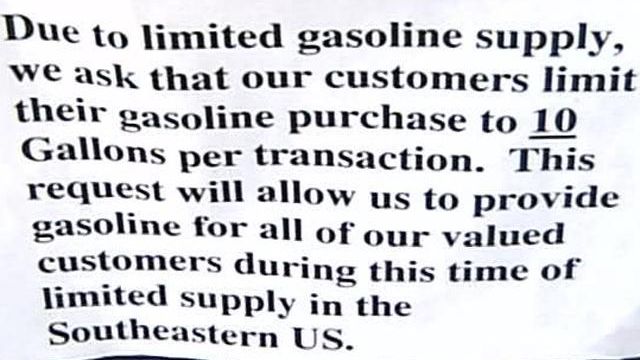Texas eyes Ike; drivers eye gasoline prices, supply
A N.C.-based company has ordered its gas stations in 11 Southeastern states to limit sales to 10 gallons. But experts cautioned against panic buying, and the company indicated sales limits could be lifted as early as today.
Posted — UpdatedThe hurricane was pushing toward the mass of petroleum refineries along the Gulf Coast, but the effect of fear that the refineries would be damaged was moving due north.
“Hurricane Ike is projected to hit landfall in Texas Friday or Saturday, and in anticipation of its storm path, refineries in the Gulf of Mexico have closed,” said David E. Parsons, CEO and president of AAA Carolinas.
“Gas prices have gone up, and some stations have placed a restriction on the number of gallons customers can buy, because it is unclear right now how long the refineries will remain closed or if they will sustain any damage,” Parsons said.
The Sanford-based The Pantry convenience store chain has ordered its 1,600 stations in 11 Southeastern to limit gas sales to 10 gallons. The Pantry operates Kangaroo and Petro Express stations.
"I guess it's a good way to help out," said driver Sterling Phillips, as he read a sign to that effect at a Kangaroo station on Avent Ferry Road in Raleigh. Phillips said that he will probably end up filling up his Jeep more often.
A Texaco station on Arendell Avenue in Zebulon was charging $4.39 for a gallon of unleaded gasoline late Friday morning.
WRAL News received several e-mails and phone calls asking about rising gas prices and reporting long lines at stations.
"I just went to the local gas station and there [were] 15 cars waiting to get gas. ... This is a country store where I never see more than 4 to 5 people getting gas at one time," one e-mailer said.
Gas prices fluctuated between $3.60 and $3.80 a gallon in the Triangle Friday morning. That average of $3.68 was 21 cents below the national average.
Some analysts predict that Ike could push prices back up to the $4 mark. However, others say people should not panic, because there is no proof yet that Ike will drive prices to such extremes.
“The worst thing that could happen would be for motorists to flock to gas stations to top off their tanks,” said Parsons. “That will worsen the situation before anyone knows what the damage will be. We encourage people not to panic, drive conservatively and don’t take unnecessary trips until the damage assessment is completed early next week.”
Pantry officials indicated that they might drop the policy as early as Friday.
CEO Pete Sodini said the request was designed "to head off any panic buying. What you're going to do if you go out and fill up every car in the household, you're going to run this market out of supply temporarily."
Sodini said the limit may be dropped Friday at some stations, depending on the supply of gasoline.
Melissa Anderson, of The Pantry, said her company does not have supply problems, but was being proactive.
"It is voluntary, just to make sure that during this period of time that people are acting responsibly. We did the same thing during Hurricane Katrina," Anderson said. "We found that our customers were receptive, appreciative and acted quite responsibly to the suggestion."
Refineries along the upper Texas Gulf Coast account for about one-fifth of the nation's refining capacity. Exxon Mobil Corp. – which has the nation's largest refinery outside Houston – Valero Energy Corp., ConocoPhillips and Marathon Oil Co. halted operations at refineries on the Texas coast.
Supply concerns sent wholesale gasoline prices soaring Thursday. The wholesale price for gasoline produced on the Gulf Coast jumped to record levels between $4 and $5 a gallon – a spike some analysts attributed to "panic buying" over Ike's potential to disrupt fuel supplies.
How much gas prices rise depends largely on how long refineries remain shuttered after the storm passes.
Gasoline prices remained relatively stable after Hurricane Gustav struck Louisiana nearly two weeks ago, in part because its punch turned out to be less severe than feared – especially when compared with hurricanes Katrina and Rita three years ago.
However, Gustav still shuttered about 15 percent of the nation's refining capacity for several days, and prolonged power outages have left some plants still in need of power or operating at reduced levels.
Ike is now taking aim at another big chunk of the country's refining capabilities – the second blow of a one-two punch that could severely crimp U.S. gasoline supplies.
ConocoPhillips said Thursday it was shutting down its refinery in Sweeny, south of Houston, even as it waited for power to be restored at another refinery in Belle Chasse, La., near New Orleans. The Louisiana facility, which halted operations for Gustav, has been closed for about two weeks.
ConocoPhillips said it was still supplying retail outlets along routes most likely to be used during the emergency.
Valero spokesman Bill Day said the company had begun shuttering two refineries in the Houston area Thursday, though two others farther south in Corpus Christi continued to operate.
Production also is a factor. Like Gustav, Ike's approach had shut down nearly 100 percent of oil and natural gas production in the all-important Gulf of Mexico as of 11:30 a.m. Thursday, according to the U.S. Minerals Management Service.
The Gulf accounts for about 25 percent of domestic oil production and 15 percent of natural gas output.
• Credits
Copyright 2024 by WRAL.com and the Associated Press. All rights reserved. This material may not be published, broadcast, rewritten or redistributed.





